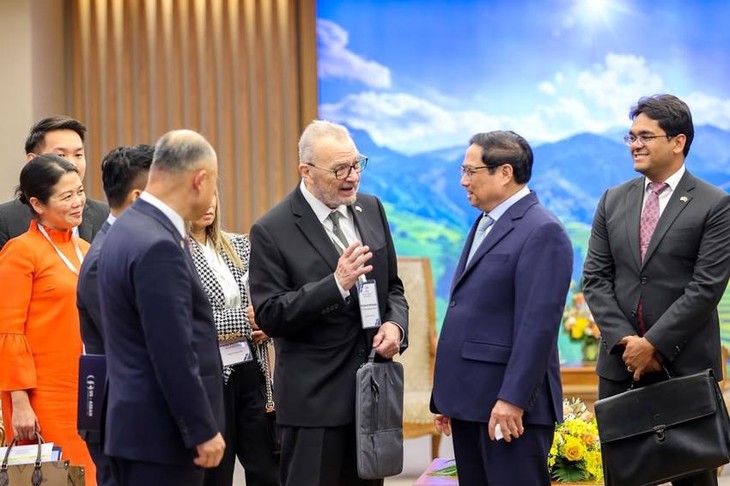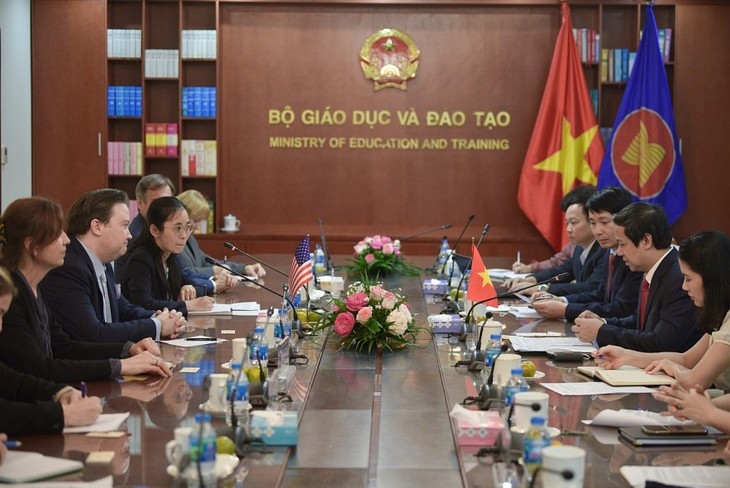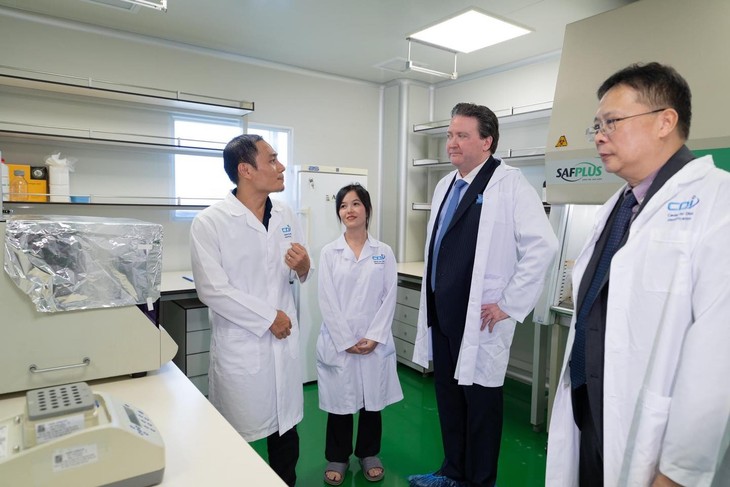 Prime Minister meets US corporate executives on March 22 during a meeting with the US-ASEAN Business Council. (Photo: VGP) Prime Minister meets US corporate executives on March 22 during a meeting with the US-ASEAN Business Council. (Photo: VGP) |
Over the past nearly three decades since the establishment of the diplomatic ties, the Vietnam-US relationship has grown and deepened in various ways, US Ambassador to Vietnam Marc Knapper made the affirmation during an interview with VOV on Tuesday.
Among the multiple areas of bilateral cooperation, Ambassador Knapper says he is impressed the most about the development of the trade and investment ties.
“Over the last 10 years our two countries’ two-way trade has grown to nearly 140 billion USD, which is just remarkable. Vietnam is now the United States’ eighth largest trading partner. The United States is Vietnam’s number one export market. The US-Vietnam, trade and economic relationship is significant,” said Mr. Ambassador.
In addition, both countries have seen significant flows of investment, whether Vietnamese investment in the US with companies like VinFast announcing a 4-billion-dollar investment in North Carolina, or American companies like Intel, and others, who are investing here in Vietnam.
“That just basically sends a message of great confidence that our two countries have in each other's economy,” said Mr.
 Education cooperation is an important pillar of the Vietnam-US comprehensive partnership. In the photo, Ambassador Marc Knapper works with the Ministry of Education and Training in Hanoi on May 4, 2022. (Photo: Giaoducthoidai) Education cooperation is an important pillar of the Vietnam-US comprehensive partnership. In the photo, Ambassador Marc Knapper works with the Ministry of Education and Training in Hanoi on May 4, 2022. (Photo: Giaoducthoidai)
|
According to Ambassador Marc Knapper, education is another significant area of bilateral cooperation where the two countries have seen great growth as over the last decade. Vietnam has jumped 3 places to rank number five in terms of having the largest number of Vietnamese students in the US.
“We have some 30,000 Vietnamese students now studying in the US. This is something which we're very proud of. It sends a very strong message about our friendship, and our future together, because you don't invest in your child's education in a particular country unless you believe in that country, unless you believe in the education that can be provided in that country,” said the Ambassador.
 US Ambassador to Vietnam Marc Knapper visits the Centre for DNA Identification (CDI) under the Vietnam Academy of Science and Technology (VAST). (Photo courtesy: US Embassy in Hanoi) US Ambassador to Vietnam Marc Knapper visits the Centre for DNA Identification (CDI) under the Vietnam Academy of Science and Technology (VAST). (Photo courtesy: US Embassy in Hanoi)
|
One of the highlights in the Vietnam and US relationship over the last 10 years is the joint efforts to address the war aftermaths, which include the cleaning up of dioxin sites, unexploded landmines, ordnance, the assistance for people with disabilities, the search for missing American service members, and now missing Vietnamese as well.
This week, the United States Mission to Vietnam, through the US Agency for International Development (USAID), announced a 32-million-USD contract given to the US firm Tetra Tech to continue the cleanup of dioxin-contaminated soil in and around the Bien Hoa Air Base in Dong Nai province.
These are all very important efforts, which have helped to build trust and friendship, promote reconciliation, and pave the pathway to the future for both Vietnam and the US.
With the achievements in bilateral cooperation over the decade, the Biden administration has selected Vietnam as one of leading regional partners in its Indo-Pacific Strategy that was launched in 2021.
It’s because the US wants Vietnam to be strong, prosperous, independent, resilient, and these are all promoted by the US Indo-Pacific strategy.
“We work very closely with Vietnam in terms of our shared interests, whether it's along the Mekong River or the South China Sea. We share with Vietnam a desire that countries in and around the South China Sea should be free from coercion, should be able to continue commerce and travel, to have freedom of navigation, freedom of overflight, to be able to decide their futures, whether it's their energy futures or trading or investment futures,” said Mr. Knapper, adding, “These are all areas the United States and Vietnam see eye to eye on. We believe very strongly in the UN Charter and the 1982 UN Convention on the Law of the Sea. And we regularly work with our friends and partners here in Hanoi on issues related to these important areas.”
Under the US Indo-Pacific strategy, the US is ready to help Vietnam play a greater role in the region and the world, said the Ambassador and took Vietnam's UN peacekeepers in South Sudan as an example.
“We've worked with the Vietnamese military to help train these participants in peacekeeping operations. We recognized Vietnam’s leading role regionally, as well, when Vice President Harris was here. She kicked off the regional CDC office here in Hanoi, which I think is a strong reflection of our belief in Vietnam's strong health role, strong health cooperation with the United States, and strong health infrastructure,” said Ambassador Knapper.
The US sees Vietnam as a bright and increasingly prominent partner, not just regionally, but globally, according to the Ambassador.
“We saw this when Vietnam hosted APEC in 2017, when it was on the UN Security Council in 2020-2021, and when it was the chair of ASEAN a couple of years ago. All of these things reflect Vietnam's growing prominence and leadership, not just regionally, but globally, and it's something we very strongly support and want to continue to foster,” said Mr. Knapper.
US Trade Representative Katherine Tai, during her visit to Vietnam earlier this year, said Vietnam plays an important role in the US’s Indo-Pacific Economic Framework for Prosperity (IPEF), a US’s new economic connectivity initiative, serving as a bridge between the US and ASEAN.
The question is what benefits will Vietnam gain from this initiative?
“Take one of these areas – supply chains. Certainly, the US very strongly believes in diversifying our supply chains, making them more resilient. We feel that Vietnam is a key to supply chains going around the world, whether it's in semiconductors or other manufactured items. Secretary Yellen talked last week about this idea of promoting more resilient, diverse, expanded supply chains among countries like Vietnam that are like-minded and share our views about the importance of, say, a free and open Indo-Pacific trade that's unimpeded, without coercion,” said Ambassador Marc Knapper.
The Ambassador said he believes the IPEF, by promoting supply chain resilience and diversification, can help promote prosperity in Vietnam. And to that end, the US will certainly continue to work on and has a strong belief that ambitious plan is completely achievable.